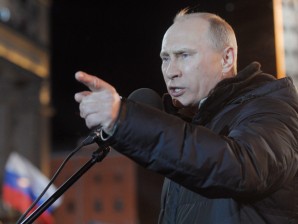
Russian Prime Minister Vladimir Putin, who claimed victory in Russia’s presidential election, speaks at a rally of his supporters at Manezh square outside Kremlin, in Moscow, Russia, Sunday, March 4, 2012.
MOSCOW—A Moscow court Friday ordered three young women on trial for staging an anti-Putin concert in a Moscow church to stay in jail until next year, a surprise move their lawyers branded “repression”.
The Khamovnichesky court ruled that the detention of the members of the Pussy Riot punk rock group should be extended for another six months, satisfying a prosecution request.
The ruling came on the first day of the womens’ trial on hooliganism charges for barging into a landmark Moscow church in February and singing a “punk prayer” calling for the ouster of President Vladimir Putin.
The trio, who face up to seven years in jail, have been held in pre-trial detention since March, and their harsh treatment has become a new rallying cause for the anti-Putin opposition.
Court spokeswoman Darya Lyakh said the new detention period would last until January 12. The next hearing would be held next week, on July 23.
“This is a political trial. This is not justice but repression with a political motive,” one of their lawyers, Mark Feigin, said after the ruling.
The members of Pussy Riot, two of whom have young children, appeared to be in a relaxed mood and smiling as guards locked them into the defendants’ cage in the Moscow courtroom.
However, the start of the trial was marked by chaotic scenes as journalists packed the court stairwell trying to gain access while a police dog that was brought into the courtroom barked loudly.
The defendants’ lawyers said they had never seen a dog brought into court and considered it yet another form of pressure.
In February the three women—Nadezhda Tolokonnikova, Yekaterina Samutsevich and Maria Alekhina—shocked worshippers by climbing into an area reserved for priests in the Church of Christ the Saviour, the country’s top Orthodox cathedral, and singing the song against Putin.
Several others also took part in the action but they were not arrested.
Dozens of supporters carrying signs in support of the trio massed outside the court Friday.
“Russia is turning into a totalitarian state,” Samutsevich’s father Stanislav said outside the courthouse.
The Khamovnichesky court on the Moscow River banks is the same court that in 2010 saw the second trial of Russia’s former richest man and Putin foe Mikhail Khodorkovsky on fraud charges, sentencing him to jail until 2016.
The head of the court—judge Viktor Danilkin, who presided over the Khodorkovsky case—made his presence felt on the first day of the Pussy Riot trial, moving in the corridors and ordering journalists around.
The trial is being led by a different judge, Marina Syrova, but Pussy Riot’s supporters pointed at the irony of the location.
“The regime loves a bit of theatre. The two most prominent trials of the last years have taken place in the same court, in neighbouring rooms,” the anti-Putin Voina (War) art collective, to which Tolokonnikova is linked, wrote on Twitter.
More than 100 of Russia’s best known actors, directors and musicians last month called for the release of the three women, saying their actions could not be prosecuted as Russia is a secular country.
Wearing trademark balaclavas, Pussy Riot caused a stir early in the year amid an upsurge of public disapproval of Putin by holding impromptu anti-Kremlin concerts at symbolic venues including Red Square.
Ahead of the trial, a leading segment on a prime-time show that aired Thursday evening on Russia’s Channel One state television network called the band’s performance “disgusting” and accused the members of seeking publicity.
“They are trying to portray (the performance) as an attack on Russia by some dark forces,” said another defence lawyer, Nikolai Polozov. “It’s theater of the absurd rather than an investigation or a trial.”